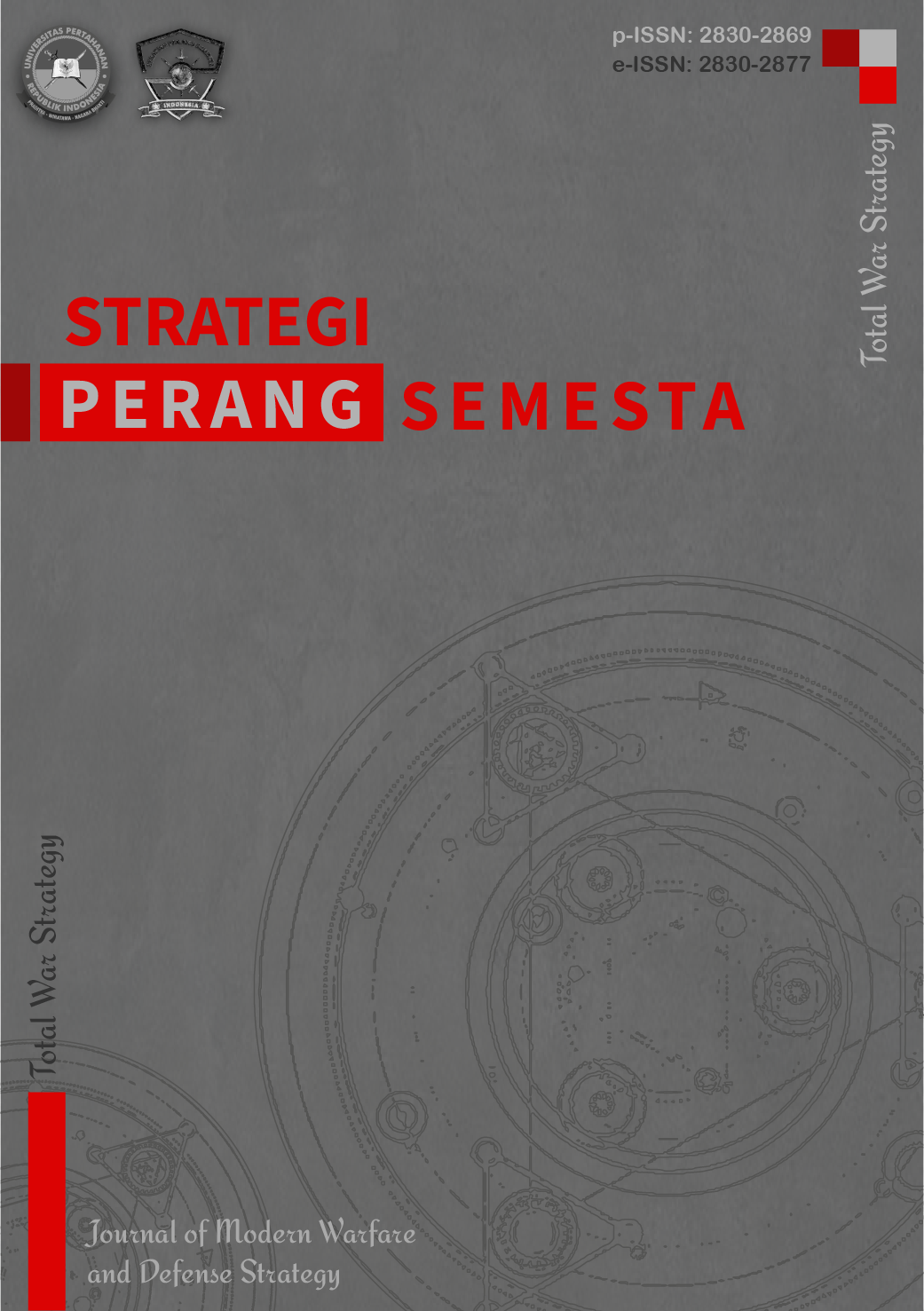State defending and neo-colonialism
DOI:
https://doi.org/10.56555/sps.v8i1.1188Abstract
The development of an increasingly modern human mindset cannot eliminate the nature of domination that tends to be put forward. The provisions made are always followed by loopholes that become a way to satisfy the desire for domination. Neo-colonialism is a picture of human love for colonialism and a reminder that colonialism still exists and covered in other motivations at first. These are the reasons for this research. Totality is a comprehensive concept of togetherness to face the threat of neo-colonialism. The nature of totality becomes stronger if it is done with sincerity based on an understanding of love to the nation. Defense the country with efforts of Bela Negara (state defending), illustrate that "nation's soul" strengthening is the main element, which aims to detect and be able to overcome the threat of new colonialism. Research purpose was to analyze the efforts of state defending to face neo-colonialism, using descriptive analytic methods. The conclusion is that neo-colonialism entered in disguise and the implementation of state defending was a powerful way to counteract it. State defending must be introduced early on, through family and the surrounding environment sustainably. Including the development of state defending organization, is needed to expand coordination, interaction and monitoring.
References
Ajzen, I. (2002). Perceived behavioral control, self-efficacy, locus of control, and the theory of planned behavior. Journal of Applied Social Psychology, 32(4), 665–683.
Andika, M. T., & Aisyah, A. N. (2017). Analisis politik luar negeri Indonesia-China di era Presiden Joko Widodo: Benturan Kepentingan ekonomi dan kedaulatan? Indonesian Perspective, 2(2), 161–179. https://doi.org/10.14710/ip.v2i2.18477
Arliman, L. (2018). Perlindungan hukum bagi anak dalam perspektif Pancasila dan bela negara. UNIFIKASI : Jurnal Ilmu Hukum, 5(1), 58–70. https://doi.org/10.25134/unifikasi.v5i1.754
Castells, M. (2010). The Power of identity. A John Wiley & Sons (2nd ed.).
Dewi, R. A., & Nurani, F. (2019). Nasionalisme sebagai antitesis neokolonialisme. Universitas Brawijaya, 1–5. http://blog.ub.ac.id/reishiastania/files/2019/12/Nasionalisme-Sebagai-Antitesis-Neokolonialisme.pdf
Gredinand, D. (2017). Penerapan pendidikan bela negara di perguruan tinggi. Jurnal Prodi Strategi Pertahanan Darat, 3(2), 1–27.
Kemhan Pertahanan RI. (2014). Doktrin pertahanan negara.
Kemhan Pertahanan RI. (2019). Tataran dasar state defending: Dalam gerakan nasional state defending. Ditjen Pothan.
Peraturan Presiden No 8 Tahun 2021 tentang Kebijakan Umum Pertahanan Negara Tahun 2020-2024.
Machmudi, Y., Noor, F., Ghafur, M. F., Fitriyah, Yasminne, A.I, N., Ascha, M. C., Hamdani, M. I., Mubarok, F., Wiharso, A., & Majiid, F. A. (2021). Era baru Afghanistan: Invasi barat hingga kemenangan Taliban (Mardiati (ed.); I). Gema Insani.
Marut, D. K. (2015). ASEAN Dalam neo kolonialisme dan imperialisme. Konfrontasi:Jurnal Kultur, Ekonomi, Dan Perubahan Sosial, 2(1), 28–38.
Ningsih, W. L. (2021). Kolonialisme: Pengertian, tujuan, dan perkembangannya. Kompas.Com. https://www.kompas.com/stori/read/2021/08/26/130000979/kolonialisme-pengertian-tujuan-dan-perkembangannya
Padoli. (2016). Mikrobiologi dan parasitologi keperawatan (1st ed.). Kementerian Kesehatan Republik Indonesia.
Sirait, H. I., Rachman, A., & Sutrimo Sumarlan. (2022). Sword of Sun Tzu in the perspective of free and active political. IAR J Huma Soc Sci, 3(1), 11–15. https://doi.org/10.47310/iarjhss.2022.v03i01.002
Soedarsono, S. (2004). Character building: Membentuk watak. In Elex Media Komputindo.
Soepandji, K. W., & Farid, M. (2018). Konsep bela negara dalam perspektif ketahanan nasional. Jurnal Hukum & Pembangunan, 48(3), 436–456.
Sorongan, T. P. (2022). Pidato Putin, alasan lengkap mengapa Rusia serang Ukraina. https://www.cnbcindonesia.com/news/20220225134715-4-318424/pidato-putin-alasan-lengkap-mengapa-rusia-serang-ukraina/4
Umra, S. I. (2019). Penerapan konsep bela negara, nasionalisme atau militerisasi warga negara. LEX Renaissance, 4(1), 164–178.
Undang-Undang Republik Indonesia Nomor 3 Tahun 2002 tentang Pertahanan Negara.
Undang-Undang Dasar Negara Republik Indonesia Tahun 1945.
Downloads
Published
Issue
Section
License
Proposed Policy for Journals That Offer Open Access. Authors who publish with this journal agree to the following terms:
- Authors retain copyright and grant the journal right of first publication with the work simultaneously licensed under a Creative Commons Attribution License that allows others to share the work with an acknowledgment of the work's authorship and initial publication in this journal.
- Authors are able to enter into separate, additional contractual arrangements for the non-exclusive distribution of the journal's published version of the work (e.g., post it to an institutional repository or publish it in a book), with an acknowledgment of its initial publication in this journal.
- Authors are permitted and encouraged to post their work online (e.g., in institutional repositories or on their website) prior to and during the submission process, as it can lead to productive exchanges, as well as earlier and greater citation of published work (See The Effect of Open Access).
Proposed Policy for Journals That Offer Delayed Open Access. Authors who publish with this journal agree to the following terms:
- Authors retain copyright and grant the journal right of first publication, with the work [SPECIFY PERIOD OF TIME] after publication simultaneously licensed under a Creative Commons Attribution License that allows others to share the work with an acknowledgment of the work's authorship and initial publication in this journal.
- Authors are able to enter into separate, additional contractual arrangements for the non-exclusive distribution of the journal's published version of the work (e.g., post it to an institutional repository or publish it in a book), with an acknowledgment of its initial publication in this journal.

